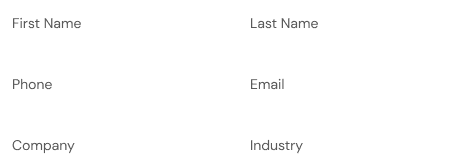
Do you work to live or do you live to work?
Every person has dreams and aspirations, and ideally, work is the vehicle to be used in making those dreams a reality. But in our current society, this isn’t the case for many people.
Because of the “hustler” mentality and glorification of overworking, a lot of people have become consumed in their work, living their lives to work instead of the other way around — working so that they can live their lives to the fullest.
Of course, it’s important to build a career that is meaningful and fulfilling, but work should not be the end-all and be-all for a person. It should be a means to an end, enabling one to achieve their life goals — whether that’s buying a house, getting an education, finding their life’s purpose or gaining financial independence.
Understanding your goals for the future will help you identify the best way to propel your career in the right direction and trajectory.
What are your goals for the future?
It’s essential for you to reflect on your life goals, pinpointing what’s achievable and what's not. This will allow you to find a career that aligns with achieving those goals, ensuring that your expertise and skill set is further developing even as you accomplish your long-term financial objectives.
Knowing your values and what you want to achieve in life will help you understand what path you need to take. Perhaps you’ve taken on job positions where you’ve been overworked and underpaid out of necessity, but it’s crucial to find a great workplace that allows you to excel at your work while helping you achieve your personal goals.
In our previous blog, we discussed how understanding personal motivations can help business owners drive growth for their businesses. In the same way, understanding your motivations and visions for the future will help you better shape your career and become more discerning about your workplace.
Examples of life goals you can set for yourself include:
- Buying your own home
- Getting further education
- Gaining financial freedom
- Saving for retirement
- Travelling the world
- Building a business
Having life goals to pursue will ensure that you have a clear idea of what you want, never losing sight of the big picture even as you go about your day-to-day at work.
Why is it essential to have an excellent quality of work life in achieving your goals?
Quality of work life is different from “quality of life” or “work-life harmony” — though it’s ideal to achieve all three. Quality of life refers to the standard of health, happiness and comfort you experience, while work-life harmony entails a healthy balance and boundary between your personal and professional lives.
Meanwhile, quality of work life measures the degree to which an employee can satisfy their personal needs through their experiences in an organisation. The quality of work life includes areas such as:
- Working conditions
- Job security and stability
- Interpersonal relationships between colleagues
- Growth and learning benefits
Your quality of work life may seem like a luxury but is actually a necessity in ensuring better performance and productivity as well as stress management. It’s also necessary to equate your current and future quality of work life to your long-term goals and plans.
It’s important to ask yourself the following questions about the quality of your work life:
- Are your working conditions sustainable?
- Are there opportunities for professional development and advancement?
- Is the work culture healthy?
- Does the company value align with yours?
- Are the company benefits comprehensive and viable?
If you’ve answered “no” to many, if not all, of these questions then it’s time to shift gears and look for another workplace that can give you a better quality of life. Your quality of work life affects how closer or further away you are from reaching your full potential and best self.
A high quality of work life can significantly benefit you in reaching new milestones at each stage of your career.
3 ways that great work can enrich your overall quality of life
There are certain things you need to look for as you search for the right workplace. Understanding the benefits of a good workplace can help you in improving your quality of work life.
1. Great work provides security and stability
Your workplace should provide you with basic security and stability, ensuring that your wage and company benefits cover all your necessities. Unfortunately, many traditional companies have a tendency to overwork and underpay their employees.
One option you can consider is finding a full-time remote job. Remote work can be an excellent source to secure a reliable and legitimate workplace while giving you the flexibility and freedom you need to pursue your other interests and commitments.
There are the steps you need to take in finding a legitimate remote job position:
- Familiarise yourself with red flags of fraudulent remote job openings
- Research potential companies and check if they comply with Philippine labour laws
- Know more about your potential employer
Partnering with an Employer of Record (EOR) can significantly ease the burdens of finding a good remote workplace. An EOR ensures that you’re protected by local labour laws when considering remote positions from international organisations.
2. A fulfilling career gives you a sense of purpose and meaning in life
Enjoying the work you do and finding a sense of fulfilment in it is crucial to thriving and happiness.
When you see how your work positively impacts your colleagues, your clients and even your community at large, it gives you a clear picture of how you contribute to the world around you.
It’s important to figure out the “why” behind why you work; is it only because of the monetary gain it provides? Does your work help you hone your craft and your skills? Does it enable you to make a difference in your small corner of the world?
The “why” of your work serves as a reminder and anchor when things start getting tough and challenging. It can steer you back in the right direction when you feel yourself getting lost or overwhelmed at work.
3. A healthy workplace encourages good work-life harmony
A toxic workplace breeds many unhealthy habits and harmful behaviours, such as overworking and too much competitiveness among colleagues.
By finding an organisation that cultivates a positive workplace culture, you can build a better work-life balance for yourself. Having work-life support from the organisation can ease your mind about anxieties or concerns you may have, particularly regarding finances. This allows you to be more focused and engaged in your work.
Your work should be fulfilling while supporting you in achieving your life goals. Understanding the qualities of a great workplace can help you in jumpstarting your career.
Are you looking for a workplace that can give you the security and flexibility you need? Connect us with your international employer and we will provide you with the proper local security and benefits.
Jump straight to a key chapter
Spending Too
Much Time
Onboarding?
your remote hiring in the
Philippines, excellently.
Say Goodbye to High Costs!
Request Your Free Consultation Today andSave a Massive 70% on Your Workforce!

Ready to thrive in a remote-first work environment?


